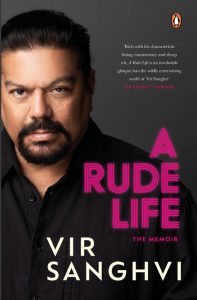by Avleen Kaur
To write books that have political blood and bones, in a country like ours, is a brave job that requires hard work. And here’s someone who’s trying to do it right by talking about important issues through deep rooted investigative journalism. We sat down with the incredible Rahul Pandita and discussed both his books, Our Moon Has Blood Clots and Hello, Bastar; the different processes that went behind writing a memoir and an investigative book, and what inspires him to write.
What prompted you to write Hello, Bastar and what are you trying to say through it?
Hello, Bastar is a labour of many, many years of travel through central and eastern India, in what are widely known as left-wing, extremist-affected districts of India. Most of these travels happened at a time when the editors and intellectuals in Delhi and other bigger cities had very little idea about the movement and how large its future could be. Nobody anticipated how it would consume us in many ways in the following years until our former Prime Minister, Mr. Manmohan Singh called it the country’s biggest internal security threat.
This book is basically about how a handful of young men and women believed in a certain idea of revolution and how they created the modern Naxal movement from the jungles of Bastar in the 1980s. Hello, Bastar is mostly meant for a non-academic reader, for someone who is a student of India and really wants to know what is happening in this part of the country.
While your previous book, Our Moon Has Blood Clots was a memoir that rose out of personal and community experience, Hello, Bastar is more investigative in nature, made out of reportage and interviews. How different were both the processes? And was the latter more comfortable considering your journalistic background?
I think Hello, Bastar was a relatively easier book to write because it was largely a part of what I do as a journalist. So, writing this did not feel as hard as the previous book which is part memoir-part reportage of the exodus and torture that happened to a minority community in the Kashmir Valley. That book was more difficult to write because of the personal history involved. And as my editor, Meru might recall that there were times when I had to wait through patches of darkness because of which the book became extremely difficult to write. But during those patches, Meru did handhold me quite a few times during the writing process for which I remain grateful to her.
Both the books talk about conflicts. Is that something that particularly intrigues you?
Well, I am a conflict writer. Early on in my career, when I came to Delhi, I made a pact with myself. I vowed that I will not report on things based out of New Delhi because most times when you care about an incident or event, you have a preconceived notion about it. And most times when you actually investigate on the ground level, you are surprised to realize that your preconceived notions about most things were absolutely false. So, the reportage part of Our Moon Has Blood Clots or the entirety of Hello, Bastar has been built out of investigative journeys made through the length and breadth of the country.
Talking about preconceived notions, there must be a lot of things you would’ve learnt during Hello, Bastar. Was there one thing that particularly shocked you or was a wild revelation?
Whenever I get a chance to interact with young people, I tell them, ‘I’ve learnt nothing in school or college. Whatever I have learnt of life, I have learnt from Bastar, really.’ I spent weeks and weeks embedded with the Maoist guerillas and Adivasis in the back of beyond and learnt years in days. So, every journey, every day has been replete with some learning. And many of those learnings have left me shocked, surprised and sometimes also thankful that I could travel to these parts and learn so much not only about these people but about life in general.
And was it difficult reaching out to a community you don’t belong to? Were you apprehensive? Were they apprehensive in sharing their life and story with you?
So again, I think this is a part of a larger problem which Indian journalism suffers from. Where journalists are just paradropped at some place because of a particular incident and they spend a couple of days there, piggybacking on the previous work of stringers or local resource persons and later on claim to understand everything about that area. In the past, I have typically called it ‘clean-bedsheet journalism’ where you leave for a small town in the morning and make sure that you come back to the small hotel by the evening. But that’s not how things work, at least in Bastar.
You have to spend a lot of time in Bastar to understand its reality. When you’re travelling in the village during the day, you might come across an ordinary Adivasi at the roadside tea shop. Later, you find out that he is a Naxal Guerilla. But that is not something you will know if you just have tea there and proceed back to your station. Conflict zones are like snake pits, you don’t know who is who until you familiarize yourself to the place.
Also, it takes a lot of time for people to open up about their story. There were times when we were embedded with Maoist groups of men and women, where young women especially would really shy away and not talk at all. But after spending some days with them and talking to them, telling them you mean well, that you’re there to know their story and make them comfortable – they open up. And that again, is unfortunately not possible when you’re there for a day or two.
Once an author wrote that he spent a lot of time in Bastar but didn’t meet a single Naxal there. I remember joking about it and commenting that Naxals are not like Coca-Cola or Haldiram Bhujia. If you go inside villages, the penetration of Haldiram Bhujia is immense. But that’s not how Naxals are to be found. You have to spend a lot of time there before they let you in.
Does the fear of backlash or controversy of writing about sensitive subjects govern your writing in some way?
I think both my books with Penguin India prove the fact that I really don’t care about labels. In the past, I have been called a specialist of this and that and I refute those claims completely. I am just a student of India. Even my twitter bio says that. I came to journalism because I had jigyaasa, the intellectual curiosity about the things I saw around me and I wanted to explore their reality. So, my modus operandi is simple. If I’m intrigued about something and want to seek answers, I seek them for myself first before seeking them on behalf of anyone else. And that has pretty much guided my reporting from anywhere in India. So, I’m not really into what is fashionable to say and what isn’t. I say what I see and I try to write passionately about it.
Do you have a particular target audience in mind when you write a book? Do you think Our Moon Has Blood Clots reached the right audience, considering the current political climate of the country?
I think I am glad that Our Moon Has Blood Clots came out when our country’s politics was slightly simpler than this. My understanding of writing is very simple. I am a firm believer of the fact that your writing should be accessible to the last man down. So, there are many people who write to me saying that we have very scant understanding of English but they were able to read my book and I consider that my strength. I also think Indian journalists often miss out on the element of storytelling. So, when I write my books, I consider them an extension of my journalism. What I really want to do is to give the feel, colour and sound of the place and people I am talking about and that comes only when you have a basic understanding of storytelling. So I think these two parameters are personally very important to me.
Politics shape every individual, especially a writer. And you, quite directly, write about overtly political issues. Considering that pen is mightier than the sword and books have the power to shape individuals, do you feel a heavy responsibility while writing?
Yes, there’s a responsibility about what you’re writing.
But again, like I said, you should not worry about labels. What you see, you see to the best of your ability. We’ve just come to this terrible and ugly situation where everything is reduced to the binary of left and right. Everyone has this pressing need to put everyone in a basket. I would not like to be in any basket. I hate this basket system. Personally, I give a lot of leeway to people. Most things around our universe are not black and white. They are shades of grey. There is a subtle nuance about everything. Who are we at the end of the day? We are the sum total of our experiences. Our politics is also shaped by what we have gone through as individuals. So, you should always keep that in mind before you accuse someone of being an urban Naxal or a closet Sanghi or any other such labels.
Lastly, do you think there is a possibility of an endeavor where Kashmiri Pandits and Kashmiri Muslims could come together to share their respective points of view regarding the 1990s in the shape of a book or an art piece together?
That’s an ideal situation. But for that to happen, the Kashmiri society from both sides has to meet somewhere. Unfortunately, we are not there right now. To begin with, the idea of reconciliation has to come from the majority in many ways. There has to be an acknowledgement about what happened in the 1990s. To the best of my knowledge, there is very little collective acknowledgement. In a private space, what a Kashmiri Pandit says to a Kashmiri Muslim doesn’t matter in the larger scheme of things. What you say collectively as a debate matters, which will then find expression in writing, art and theatre. I think some work here and there gets done. My friend, M.K. Raina is an eminent theatre personality and he tries to perform initiatives like these. There are plays in which both Kashmiri Pandits and Muslims have participated. And you will find a microcosm of this in things such as weddings sometimes. There’ll be a Kashmiri Pandit wedding and a Kashmiri Muslim singer will be performing there and everyone will be nostalgic about olden times. But these events are far and few and come from a personal space. But in terms of society at a larger level, these efforts are largely missing.
If you’re intrigued to read Rahul Pandita’s works, you can get your copy of Our Moon Has Blood Clots and Hello, Bastar at your nearest bookstore or through Amazon.









